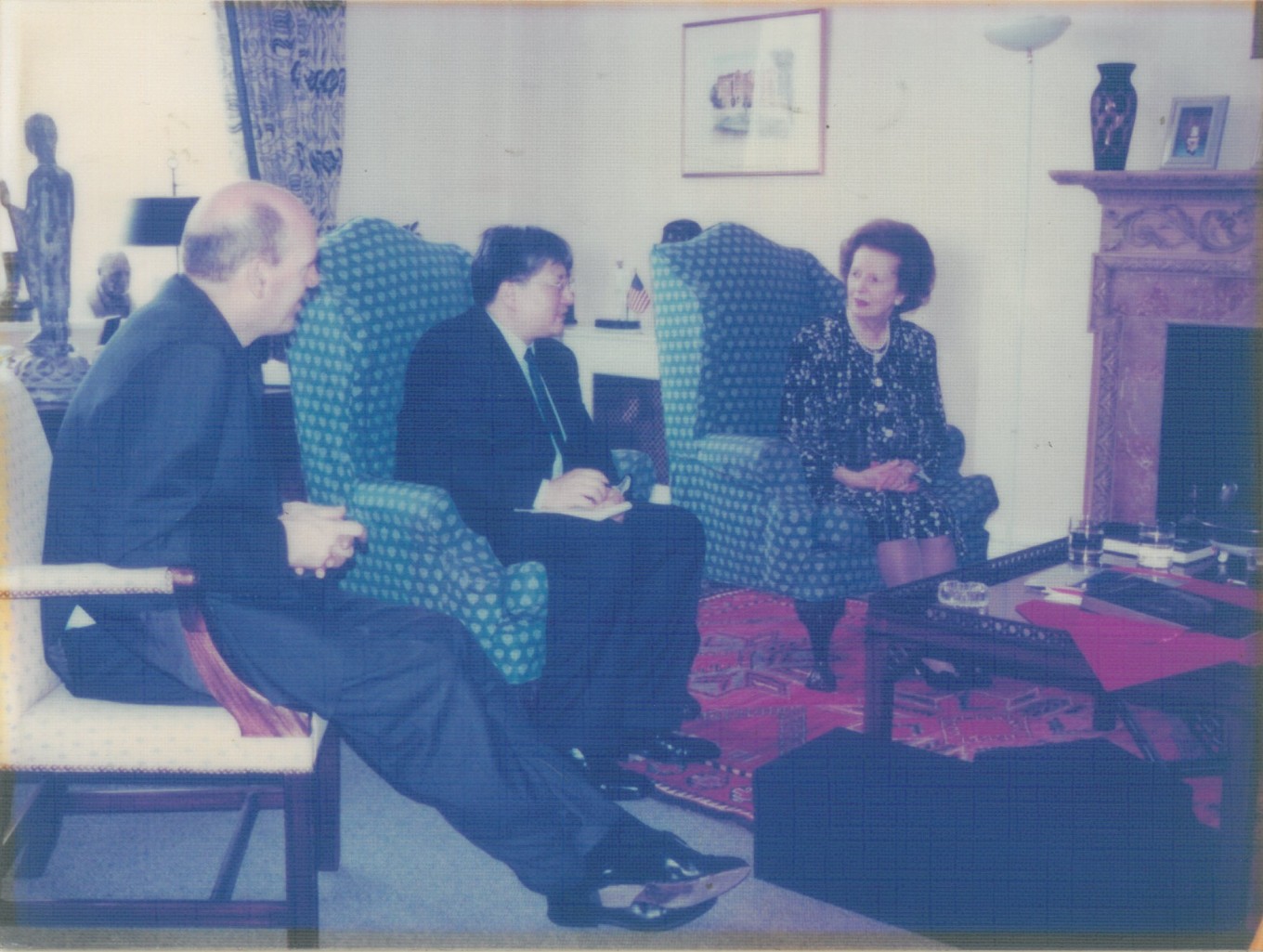The Iron Lady’s Legacy: A Chinese Perspective
“You can love her, you can hate her, but you cannot ignore her,” and with these words from Carol Thatcher, the daughter of the former British Prime Minister, we have an insight into the nature of this truly unique woman. These are the opening words to the BBC documentary ‘The Iron Lady’, which was first broadcast hours after the death of Margaret Thatcher on April 7th. These words have been often repeated in the past week and that is because there is much truth behind them.
It is no exaggeration to say that she was the most controversial figure in British history. The chaotic political and economic environment in the UK during the late 1970s required new thinking, and it was through privatization and reigning in the Unions that Mrs. Thatcher did this. This, of course, has led to a distinctive love-hate relationship for many people.
She is an often copied icon for many female politicians; her hairstyle was the de-facto style for at least a decade.
The British Guardian newspaper underlined her legacy in their editorial, “Whether you were for her or against her, Margaret Thatcher set the agenda for the past three and a half decades of British politics. All the debates that matter today in the public arena, whether in economics, social policy, the law, the national culture or this country’s relations with the rest of the world, still bear something of the imprint she left on them in her years in office between 1979 and 1990.”
If you look back over Margaret Thatcher’s life, you can see what an extraordinary road she travelled. Whether you look at her rise to become the youngest Cabinet member of her generation or her very humble beginnings through to her studying chemistry at Oxford University, whether it is her support of her husband, Denis Thatcher, or in her towering strength in her convictions in beating her former-mentor Prime Minister heath, Thatcher was a once in a generation politician.
In the political sphere she was no less extraordinary. From reinvigorating dead-end industries through privatization and encouraging competition to dealing with the minor’s strikes, reigning in Union demands and eventually implementing a new Trade Union Law. She implemented the right-to-buy program and faced down a world divided by complex geo-political issues, and in 1982, took the difficult decision to go into armed conflict. Her legacy, one which was driven by a desire to not turn from your objective, is still being felt in the United Kingdom and across the world. Even when many of her closest confidents abandoned her, she would swallow her tears and demonstrate true strength.
The BBC documentary, to which I referred earlier, underlined the so-called mixed reaction to her legacy. The documentary describes what it sees as one of the major failures of her time in office, her failure in allowing the sovereignty of Hong Kong to pass to China, instead of affording the people true self-determination.
I was fortunate enough to meet Margaret Thatcher in person some 13 years ago. It was September 2000 and it had been ten years since she had stood outside Downing Street and announced she was stepping down. I was fortunate to be selected as an interpreter for the meeting between Margaret Thatcher and late Chinese state leader Deng Xiaoping’s daughter, Miss Deng Rong, while she was visiting London. The meeting was arranged through Mr. Miles Young, then the Asia Pacific Chairman of Ogilvy through his connections with Carol Thatcher’s best friend, Valerie.
I was excited by our forthcoming meeting. For one I had read her biography, ‘The Downing Street Years’ but I was also keen to see her reaction when she meets the daughter of Deng Xiaoping.
It was a bright sunny afternoon and I remember sitting with Carol and Valerie and Miles having lunch close to the Thatcher residence in quiet area of London, preparing for the afternoon meeting. Once inside you never got the impression of luxury, but more an understated elegance and magnificence. We were taken to the second floor living room where Mrs. Thatcher asked the guests to sit at the table close to the fire place. I, and Miles, sat beside her. This was an extremely arresting moment because I simply couldn’t believe that I was allowed to sit so close instead of my normal arranged position behind the host as a translator, for which I had become very accustomed. I had a feeling that she liked to be close to everyone she was meeting, to allow them to feel comfortable and to make the situation feel as natural as possible. Even though, at this point, she had been a decade out of office, she still dressed with style and her hair was the familiar style seen the world over.
Soon, of course, the talk turned to the main subjects expected to hear. When talking about Deng Xiaoping, she said “Deng Xiaoping is a great man and he is a leader of intensity. His economic reforms have lifted hundreds of millions of Chinese people out of poverty; he has afforded them a better life.”
On the question of Hong Kong, she eloquently outlined the essence of the Sino-British Joint Declaration, namely “return of sovereignty”, “Hong Kong ruled by people of Hong Kong” and a “high level of autonomy”, simply stating “the every one of these essences, of which, became the consensus for the future of Hong Kong, took years of negotiation between the two parties”. She continued “To this end years of Sino-British politicians have made great sacrifices, put to one side cultural differences and ideologies, and with great wisdom have come to a solution.”
She spoke of how delighted she was that the handover had not descended into unrest as so many people had predicted. In fact, after three years with the sovereignty of Hong Kong returned to China, she was pleased to see Hong Kong as one of the leading world’s financial centers, still has its social stability maintained and with it people’s lives remained peaceful.
I remember asking her what she considered the difference between a male and female Prime Minister. Her answer surprised me because it was identical to her bibliography answer, although the question had been asked a million times before, she said “How could I know since I have never experienced the alternative.”
She went on to discuss how she thought that it mattered not if you were male or female; it is always difficult to be a politician. She described, as scientist, never forget that I’m a research scientist by background, you can have many ways to try before achieving your goals, by achieving your goals the way you have found become science; . She continued that as businessman you have many ways to become successful, sometimes you win and sometimes you lose. However she continued while pondering, as a politician you are left with only one way, you have got to win or you lose. She felt that as a politician you must understand politics, economics and science.
When it comes to her views on the new elected President of the United States George W Bush, we are offered an insight into her worries about his lack of international experience. When asked this question, her answer is “it’s hard to imagine, a president with a lack of international experience can lead a country as powerful and influential to the world as the United States”. If you take a look at how the war in Iraq took place a few years after, Margaret Thatcher’s concern may denote a strong footnote to the importance of international experience in relation to our political leaders.
The meeting took place in a peaceful and amicable manner, and such was the nature of the setting we failed to realize that the meeting had overran by sometime without anyone noticing.
When I look back to this unforgettable talk and look at the life of Mrs. Thatcher, I understand one thing. A successful politician, when implementing a major social change or reform, different socio-economic groups will benefit in varying degrees. Therefore, the controversy after she passed away is reasonable. But what is unusual for a politician is the choice he or she makes on deciding the political future of a nation.
Britain in the 1970s witnessed sluggish economic growth and the prevalence of the Labour Union and political parties. Mrs. Thatcher’s reforms boosted the British economy and fundamentally shaped development in the 30 years that followed. In major social change or reform certain benefits of some groups are sacrificed and other groups are strengthened. To balance in-between all this and to achieve his/her own goal is what marks an extraordinary politician.
The life of Mrs. Thatcher also makes me realize one other thing. You can have allies and colleagues but when it comes to the pressure caused by change and revolution, everybody pursues different things. Essentially, having too much emotional attachment will misguide you; human-beings need to become stronger when dealing with emotional in order to lead with clarity.
Mrs. Thatcher was in power for eleven and a half years, during which time she achieved many of the things that she set her sights on. Even though opinion will remain mixed, she still is, in my mind, the equal of Churchill as one of the two greatest British Prime Ministers of the 20th Century.



